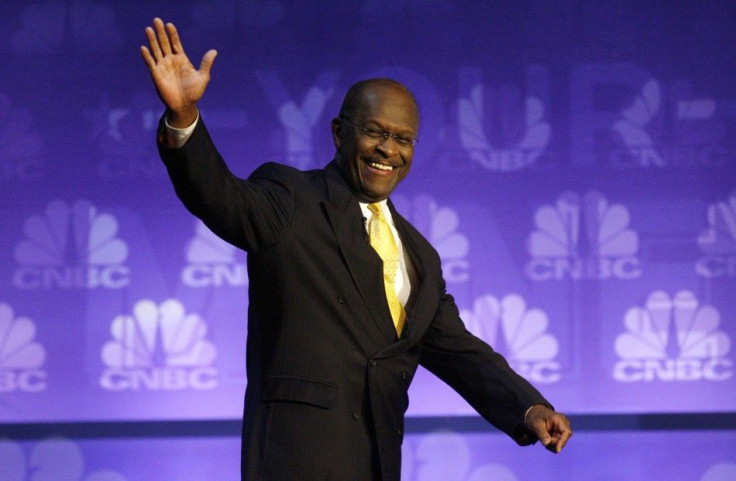Voice Analysis Proves Herman Cain Is Innocent of Harassment: Private Investigator

A private investigator in Atlanta claims that expensive voice software can prove Herman Cain is innocent of the sexual harassment allegations made against him.
When Cain denied the charges at a press conference on Tuesday, investigator T.J. Ward told CBS Atlanta, the $15,000 software did not detect subtle changes in his tone of voice that would indicate dishonesty.
If he is hiding something, this thing would have spiked, Ward said. He is being truthful, totally truthful. He is a man with integrity and he talked directly about not knowing any incident he is accused of.
But when Ward ran the same test on the statement that accuser Sharon Bialek made at a press conference on Monday -- that Cain suddenly reached over, put his hand on my leg under my skirt and reached for my genitals and grabbed my head and brought it toward his crotch -- the software deemed it a high-risk statement, meaning it detected suspicious voice changes.
I don't think she is fabricating her meetings, Ward said, but she is fabricating what transpired during those meetings.
New Dimension to Cain Sexual Harassment Scandal
Ward's findings add a new dimension to the sexual harassment scandal that has engulfed Cain's campaign for the past week and a half, bringing the Georgia businessman down in the polls after more than a month as a front-runner for the Republican presidential nomination.
Cain has vehemently denied the allegations of four women, two of whom -- Bialek and Karen Kraushaar -- have spoken publicly and two of whom remain anonymous. Bialek and Kraushaar have both stood by their stories in spite of Cain's denials. It is very much a he-said-she-said situation, and if the voice-analysis software really is 95 percent effective, as Ward says, that would be major evidence in Cain's favor.
Voice-Analysis: How Reliable?
But questions have been raised in the past about how reliable voice-analysis software really is as a lie detector.
Proponents say it is more accurate than traditional polygraph tests, which look at physiological traits like blood pressure, pulse and respiration rather than voice qualities. According to Ward, the software he uses -- layered voice analysis, or LVA, which is manufactured by Nemesysco in Israel and distributed in the United States by the Wisconsin-based Voice Analysis Technologies -- is 95 percent accurate and employed by 70 law enforcement agencies around the country.
Another Type of Analysis: CVSA
However, another type of voice-analysis software -- the National Institute for Truth Verification's computer voice stress analyzer, or CVSA, which claims a 98 percent accuracy rate -- came under fire in 2006 when ABC News reported that it had falsely implicated several people in crimes they did not commit.
The United States military used to use the CVSA software when interrogating suspected terrorists in the Guantánamo Bay detention center in Cuba, but the Pentagon banned it after a study showed it was no more reliable than a coin flip.
Additionally, when the family of a man who was falsely accused of murder based on the results of a CVSA test sued the manufacturer, a psychologist who tested the software for the Michigan State Police Department testified under oath that it did not actually work, ABC News reported.
This device is nothing more than a prop, the psychologist, John Palmatier, said. You could not accurately discriminate between truthful and deceptive subjects using that device. He said police mostly used it as a scare tactic to get suspects to confess.
But Ward told the International Business Times that LVA technology is much more effective than CVSA because it looks at more than just stress levels.
Voice stress [CVSA] will not do what this will do, because it works strictly off of stress, Ward said. Ours works off of involuntary changes of voice, with 2,800 different algorithms: what goes to your brain, what comes out of your mouth, what you're thinking and these involuntary changes.
© Copyright IBTimes 2024. All rights reserved.





















